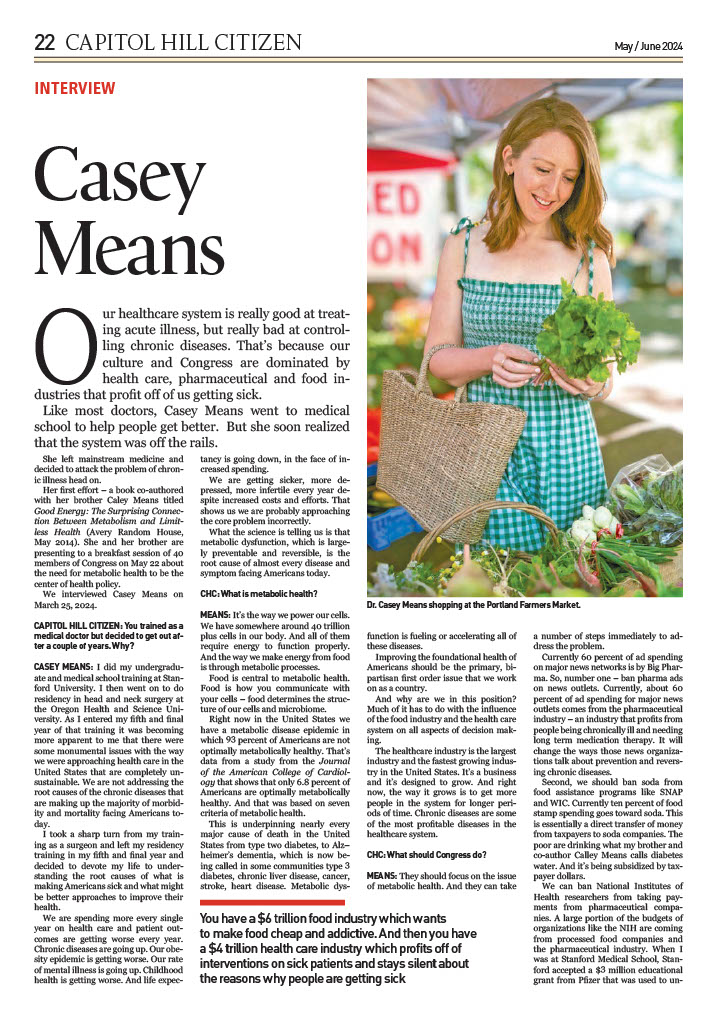Our healthcare system is really good at treating acute illness, but really bad at controlling chronic diseases.
That’s because our culture and Congress are dominated by health care, pharmaceutical and food industries that profit off of us getting sick.
Like most doctors, Casey Means went to medical school to help people get better.
But she soon realized that the system was off the rails. She left mainstream medicine and decided to attack the problem of chronic illness head on.
Her first effort – a book co-authored with her brother Calley Means titled Good Energy: The Surprising Connection Between Metabolism and Limitless Health (Avery Random House, May 2014).
That’s according to a report in the May/June 2024 issue of the Capitol Hill Citizen.
“You have a $6 trillion food industry which wants to make food cheap and addictive,” Casey Means told the Citizen. “And then you have a $4 trillion health care industry which profits off of interventions on sick patients and stays silent about the reasons why people are getting sick.
“Currently 60 percent of ad spending on major news networks is by Big Pharma. So, number one – ban pharma ads on news outlets. Currently, about 60 percent of ad spending for major news outlets comes from the pharmaceutical industry – an industry that profits from people being chronically ill and needing long term medication therapy. It will change the ways those news organizations talk about prevention and reversing chronic diseases.”
“Second, we should ban soda from food assistance programs like SNAP and WIC. Currently ten percent of food stamp spending goes toward soda. This is essentially a direct transfer of money from taxpayers to soda companies. The poor are drinking what my brother and co-author Calley Means calls diabetes water. And it’s being subsidized by taxpayer dollars. We can ban National Institutes of Health researchers from taking payments from pharmaceutical companies.”
“A large portion of the budgets of organizations like the NIH are coming from processed food companies and the pharmaceutical industry. When I was at Stanford Medical School, Stanford accepted a $3 million educational grant from Pfizer that was used underwrite the curriculum.”
“These types of financial relationships between medical schools, schools of nutrition and the industry are compromising. To curb this, we should ban conflicts of interest for schools of nutrition.”
“For the same reason, I would stop federal funding for academic departments who take money from pharma.”
“And then we should address the farm bill to increase subsidies for specialty crops like fruits and vegetables. Currently in the farm bill, health disease reversing and disease preventing foods like fruits, vegetables, nuts, seeds and spices are considered specialty crops.”
“They are a fraction of total farm bill spending. The majority of farm bill spending goes to commodity crops like corn, soybeans and wheat, many of which are turned directly into ultraprocessed foods that are directly harming Americans and driving up health care costs. Congress should also eliminate added sugar from the national school lunch program. Currently the USDA allows for ten percent of a child’s diet to come from added refined sugar. That’s a travesty.”
“A child’s body does not need a single gram of added refined sugar. We are not talking about natural sugars coming from fruits. We are talking about industrially processed added sugars. In the face of a monumental metabolic disease epidemic, the fact that we are putting astronomical amounts of added sugar into the national school lunch program, which serves hundreds of millions of meals per year is just a travesty.”
“And then we could increase the amount of pre-tax spending – things like health savings accounts and flexible spending accounts – toward healthy food and exercise expenditures. Currently, it’s very simple for people to use their HSA and FSA dollars to buy medication.”
“But they have to jump through hoops to use preventative or disease reversible strategies like healthy food and exercise. We should make it just as easy to pursue these preventive and disease reversing strategies. Many of these interventions could be done through executive order.”
“Given the rates of disease we have today, it should be considered a health care emergency. Why is there so little action in Congress? One fact is that there are tens of millions of constituents working in the healthcare industry and the ultra processed food industry. You also have heavy layers of conflicts of interest with people making public policy. The people who drew up the most recent food guidelines in 2020 at the Department of Agriculture had direct conflicts of interest with the processed food industry. There are layers of conflicts. And then the issue has been made to seem complicated. There is a sense that the issue is so large and hard to fix. But my brother and I are saying – there are some simple and straightforward public policy actions we could take quickly that would have a monumentally positive”
“If we did have doctors, policymakers, leaders of healthcare systems coming together and standing on the steps of Congress and saying – we need to get rid of ultra processed foods, we need to reduce added sugar to zero, we need to be promoting local sustainably grown food, we need to get pesticides off the foods and improving the biodiversity of the soil – if everyone were saying that in unison, things would change.”
